The Mason: A Gentleman
The Freemason’s Chronicle,
January 2, 1875, Issue 1
This opening article was written 145 years ago, yet it resonates with Freemasons today as it did then.
Members of the Craft are, one and all, agreed as to the social, moral and religious advantages of Freemasonry.
The Master Mason, whatever his creed or country, knows that his connection with the Institution has superadded to his other opportunities of becoming a good citizen, a rule of life which embraces all the blessings that lie scattered up and down the various beliefs into which the nations of the world are divided.
He becomes assured that honour, virtue and benevolence are the qualities which should alone distinguish one class from another: and that within the sacred bond of brotherhood all good Masons are equal in the eyes of the Great Architect of the Universe.
Unfortunately, the outside or popular world, who have not entered the penetralia of the Craft, are apt to apply to its members the ordinary tests current in social life.
Hence it is of vital importance to the Institution itself that all its members should be persons of blameless lives, and it is equally important that they should be possessed of that culture which distinguishes the gentle from the un-gentleman.
It seems to us quite possible that a brother may be a good, ordinary Mason, capable of fulfilling all the duties enjoined in the principles of brotherly love, relief and truth, and yet be wanting in that trained scholarship which, although it enhances the courtesies of life, is too often found along with a cold, cynical understanding.
At the same time, we think it imperatively necessary that every Freemason should use his best endeavours to polish and refine his intellect.
Indeed, we go further, frankly and fearlessly stating our opinion that no man should be chosen to hold office whose cultus will not enable him to do honour to the great and important duties of his station .
What passes behind the closed doors of a Masons Lodge is sacred from all the world.
The seal of secrecy is set upon the Mason’s heart and upon his lips.
His is not a creed of proselytism.
His duty lies clear and straight before him.
So to conduct his life, so to comport his actions, that all the outer circles of men may know he is one of a glorious band of brothers, pledged to lead pure, clean lives, to help the sick and needy, to speak and act the truth, of which his insignia are but the symbols.
Seriously impressed with the sacred and secret character of the Craft, we, nevertheless, understand it to be well known that Freemasonry embraces a ritual which, for magnificence of declamatory composition, is perfect in its way.
Our contention is, that such a ritual should, at all times, be entrusted to ministers in whose mouths it should lose none of its sonorous and impressive qualities.
The calls to virtue and to loving kindness, the charges to acts of self abnegation and friendship, of the pure and beautiful love, where shame and passion have no place, should be uttered in tones where musical intonation hold a just rivalry with exactness of accent and perfect grammar.
If it were otherwise, what would be the result? It seems to us it would be possible for men of imperfect education, but of fussy, pushing natures, on their entrance into a Lodge, to lose no opportunity of thrusting themselves forward, in season and out of season, until, with the energy which not seldom accompanies vulgar minds, they had obtained office in the teeth of fitter, but more modest brethren.
It would be possible for such as these, backed by the power of the purse—which Freemasonry does not recognise, but which need not be left out of the calculation of probabilities—we say, it would be possible for such as these so to administer the duties, weakly entrusted to their keeping, as to drive from the field of local Masonic activity persons of greater culture and refinement.
If such a state of things were possible it would be a pity.
How much greater would be the pity, then, if there were introduced into the society of such persons, some neophyte of superior mental advantages, who, shocked at the incongruity of the position, retired during the first stages of his enlightenment, and before all the magnificence of the system dawned upon his astonished sight.
Surely these are possible harms it would be good to guard against.
These, however, are misfortunes which, being confined to the Craft itself, might possibly pass unreproved, if not uncriticised ; but there are greater than these.
Let us take a supposititious case.
We will suppose some Royal personage to be on a visit to a great provincial town.
The Mayor and Corporation have exhausted their powers of invention in providing a variety of entertainments.
There has been the inevitable concert in the Town Hall ; the visit to local manufactories ; the district Flower-show, and, indeed, the general round of mild dissipation proper to the occasion.
At last it suggests itself to the provincial Grand Lodge that a monster Masonic Ball would give the very tone of liveliness desired, and, permission being granted for the use of clothing, the great work is set in motion.
We will suppose all the preliminaries to have worked smoothly.
The magnates of the county to have received and accepted invitations, and the eventful evening to have at length arrived.
The brethren are assembled, ranging upward from the simple white kid and pale blue silk, to the purple and scarlet and gold ; the collars and jewels we all aspire to obtain.
Delicate girls and shrewd educated matrons are present, with keen eyes for all the pomp and whatever else may be visible.
There are many expressions of pleased surprise that Lord So-and-So, or Mr. Nominate should be a Freemason, and in course of time, when matters have settled down somewhat, the question becomes bruited about, who is the Chairman, or President, or Master, as he is called, of the local Lodge?
Suppose it possible, in such an event, that it should become current this same Chairman, or President, or Master, is no other than a certain person who is notoriously deficient in culture; one, whose lapses in good breeding, and ignorance of the courtesies of society, are the common joke of the town.
If such a thing were possible—we do not say it is—it would be a reproach to the Order of Freemasonry.
We may be asked, would we place mere cultivation, and what are called manners, above sterling integrity and a good heart ? Our answer would be that, in the affairs of ordinary life we should not do so, but we think all representative men should possess these ornamental attributes ; and, just as an ignorant and vulgar man is out of place in the pulpit, in the senate, or in the town council, so he is out of place as the Officer of a Masons’ Lodge.
All men cannot, nor is it desirable they should be, Lord Chesterfields, but all men aspiring to represent institutions should be possessed of as much polite learning as will honour the position they hold.
Certain Englishmen of the middle rank are too apt to despise what they somewhat contemptuously entitle manners, but we have the authority of the Laureate that ‘manners are not idle, but the proof of loyal nature and of noble mind’.
We are particularly anxious to impress on our brethren of the Craft that The Freemason’s Chronicle will never degenerate into the organ of carping criticism.
There will be no attempt, in the interests of smartness or fine writing, to wield the glittering rapier of sarcasm against less gifted members of the bod y to which we are proud of belonging.
At the same time we have an abiding belief in the good effects of honest outspoken opinion.
It will be observed that we have carefully abstained from making the simplest direct charge.
Our argument is that in becoming a Freemason a man does not abrogate one single responsibility which heretofore he owed to society, but that he takes upon himself new responsibilities to an ancient, venerable, and respectable corporation.
That in his new position, if he aspire to the honours as well as the benefits open to him, it is imperatively necessary that he should make himself worthy of them.
Nay more, that if a period should ever arrive when the picture we have drawn might appear a true one; when we should chance to see ignorance and vulgarity elevated to the seat of the teacher, it would be time for those who love the Craft to lift a warning voice.
Certain of the ancient philosophers are said to have afforded instruction from behind a veil.
The students heard the advice of the master, but they did not see his face.
In that condition of learning many wise truths, kindly spoken, doubtless appealed to the intelligence of those who heard and comprehended.
Pray that we may be no less fortunate.
 The Freemasons Chronicle, a weekly record of masonic intelligence, was first published 2nd January 1875 London, England as an independent weekly journal of masonic interest and continued for 27 years.
The Freemasons Chronicle, a weekly record of masonic intelligence, was first published 2nd January 1875 London, England as an independent weekly journal of masonic interest and continued for 27 years.
It should be the business of a journal devoted to the interests of the Order to attempt the removal of prejudices such as these, which, though they may have little perceptible influence upon the prosperity of the Fraternity, yet have the effect of preventing timid or ill-informed persons from enlisting under its banner.
It will not only attempt to keep pace with the growing literary requirements of the day, but it will seek to exhibit the Order to the non-Masonic world divested of its technical details, and clothed in the garb of Charity and Brotherly Love.
The questions of the hour, which exercise the minds of thoughtful men, will be handled freely and broadly, without any tinge of political or sectarian bias.
The memoranda of Masonic gatherings which will appear from week to week, will be full and accurate; and as free interchange of opinion is one of the best signs of life and vigour in any society, ample scope will be given for Correspondence on topics of interest to the Order.
If we may venture upon a new rendering of words which recent events have made memorable, we will say here, once and for all, that we will be keen men of business, and will spare no effort, consistent with honour, to achieve commercial success; but first, and before all things, we will prove to our brethren and the world that we are FREEMASONS.
Recent Articles: The Freemason's Chronicle
 Operative And Speculative Masonry Explore the fascinating transition from Operative to Speculative Masonry in our latest post. Discover historical insights from Augustus C. L. Arnold and Rev. Wm. P. Strickland, shedding light on Freemasonry's evolution and its enduring principles. Dive into the rich history and significant milestones that shaped modern Freemasonry. - The Freemason's Chronicle - 2 September 1876 |
 Discover the true essence of Freemasonry, an ancient order founded on the profound principles of love for God and man. It's a call to rise above mere appearances, to embody genuine virtue and benevolence, transcending societal pretense. Embrace the transformative power of simplicity, and let the authentic glories of Freemasonry inspire your path. |
 Discover the intriguing story of a man who became a Mason but openly professed his dislike for the institution. Unravel the peculiar circumstances that led him down this path and explore the unexpected consequences that followed. Dive into this thought-provoking account that challenges our notions of loyalty and reveals the complexities of human nature within the Masonic fraternity. |
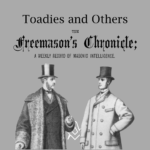 In the realm of Masonry, the principles of equality and respect are paramount. Yet, the presence of toadies—those who obsequiously seek favour from the influential—threatens these ideals. While Masonry embraces diverse beliefs and backgrounds, it rejects the sycophantic behaviours of toadies, flunkeys, and tuft-hunters, urging members to uphold genuine respect and self-worth. The Freemason's Chronicle - 22nd January 1876 |
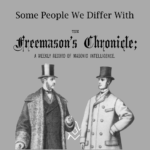 Unveiling the Unpleasant: Some People We Differ With Discover the intriguing dynamics of quarrels within the Masonic brotherhood. From the cantankerous to the litigious, the peevish to the vengeful, delve into the characters that challenge fraternal harmony. Explore their motives, temperaments, and the art of navigating disputes with these fascinating brethren. Brace yourself for a riveting journey into the world of conflicting personalities. |
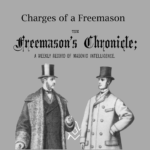 Unravelling the Masonic Mystique: A Deep Dive into the Freemasons' Charges - Explore the intricate world of Freemasonry, its principles, rituals, and the mechanisms for resolving internal disputes. Discover how this ancient fraternity fosters unity, promotes moral conduct, and upholds the sanctity of its secrets, while navigating the complexities of modern society. - The Freemason's Chronicle - 4 December 1875 |
 Unlock the hidden lessons of Masonic Studies! Don't settle for superficial knowledge or mere rituals. Discover the true depth and meaning behind Freemasonry. Expand your understanding of Tracing-Boards, Lectures, and more. Join regular Lodges of Instruction to enhance your Masonic journey. Become a knowledgeable Freemason, not just a token-bearer. Unleash the power of true Masonic wisdom today! |
 Uncover the incredible story of how Masonry saved the life of a Crimean War foot soldier in this historical and masonic account. Through the first hand experience of a soldier engaged in fierce hand-to-hand combat, witness the fateful encounter with a Russian Freemason that changed the course of his life. Learn how brotherhood and a deep dedication to the craft can lead to unforeseen and life-saving circumstances on the battlefield. |
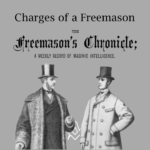 The Freemason's Chronicle - Charges of a Freemason The secrets of Masonry are the exclusive property of the Craft, and can never be communicated to one who is a mere labourer and not an accepted Mason. Hence, no labourer, that is, one who has not been regularly initiated in a legal Lodge. Article first published in The Freemason's Chronicle, 27 November 1875 |
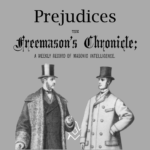 The Freemason's Chronicle - Prejudices Prejudices are partial judgments in favour of, or against certain persons or things, and, for convenience sake, may be ranged in two categories—those which are, comparatively speaking, harmless, and those which are harmful. Article first published in The Freemason's Chronicle, Oct. 2 1875. |
 The Freemason's Chronicle - Cliques Is Freemasonry - a Clique ? Man has been defined as a gregarious animal, but in his highly civilised condition he is gregarious only to a limited extent. First published in The Freemason's Chronicle, Oct. 2 1875, addresses the same challenges then as now. |
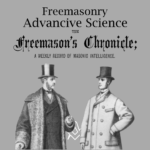 The Freemason's Chronicle - Freemasonry - an Advancive Science Is Freemasonry - an Advancive Science ? Not to confuse advancement with innovation. Has it been the case that Freemasonry's survival for 300 years plus is due to being an Advancive Science, tending to advance. First published in The Freemason's Chronicle 18 September 1875, addresses the same challenges then as now. |
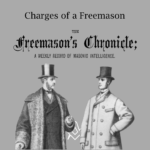 The Freemason's Chronicle - Charges Of A Freemason An interpretation of the "Charges of a Freemason", written Bro. Cornelius Moore and published in 1875, that introduce certain opinions that for some readers, will not sit well in contemporary times. - The Freemason's Chronicle, Sept. 11, 1875 |
 On The Order Of The Temple And Its Doctrine. THE Order of the Temple is divided into two great classes, denominated respectively the Order of the Temple and the Eastern Order. The Eastern Order gave birth to the Order of the Temple, and in the course of time has become an appendage of the latter. It is in ancient Egypt that we find the cradle of the Eastern Order. The Freemason's Chronicle, Sept. 4, 1875 |
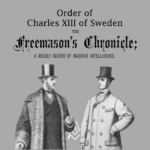 Order of Charles XIII of Sweden The following translation of the Manifesto of King JL Charles XIII of Sweden, on the occasion of his establishing the Masonic Order which bears his name, and of the Statutes of the said Order, may be interesting to our readers. The Freemason's Chronicle, Aug. 28, 1875 |
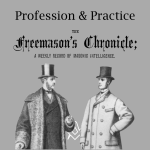 Most of our readers in the course of their experience, have doubtless met with enthusiastic brethren who take it for granted that a Mason can do no wrong. These enthusiasts are thoroughly convinced that the vast majority of those who join the Order are the most benevolent, the most moral, and the very noblest members of society. - The Freemason's Chronicle 10 July 1875 |
 An article investigating the relationship between masonry and citizenship. Are the principles of Freemasonry aligned with the freemason's claim to be a better citizen of the world? The Freemason's Chronicle - 19 June 1875 |
 A visitor must make clear his identity to the satisfaction of the Lodge he proposes to visit. More than once have we been asked to explain our views as to the reception of strangers in a Lodge. - The Freemason's Chronicle - 29 May 1875 |
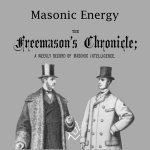 Is there reason in the accusation that Masonic energy looks only to a course of good feeds, when we can point to such grand results as have been achieved in these latter years, both in respect of the extension of our Order ? - 1May 1875 |
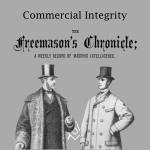 Implementing Freemasonry's peculiar system of morality in our day to day business affairs was the topic of this article, Commercial Integrity, first published in The Freemason's Chronicle - 8 May 1875 |
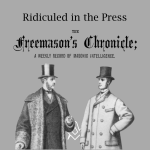 Ridicule has been somewhat illogically described as the test of truth. If it were so, Freemasonry ought to have perished long since. Two press reports from May 1875 covering the |
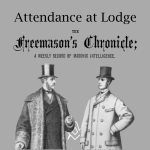 There are many things which Freemasonry will do for a man in the way of opening his mind and giving him larger and kindlier views of life, but Freemasonry itself, cannot eradicate the natural bias of the disposition. |
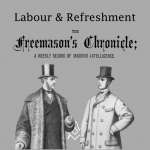 There is, we fear, too marked a tendency in very many Lodges to hasten through its labours, with a view to entering, as soon as possible, upon the business of refreshment. - The Freemason's Chronicle 17th April, 1875 |
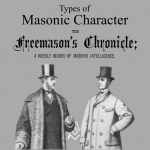 Another example that demonstrates that nothing really changes in Freemasonry. In an article the Types of Masonic Character published 145 years ago in The Freemason's Chronicle 10th April, 1875 |
 A brief history on the relationship between the British Monarchy and the craft - The Freemason's Chronicle 20th March , 1875 |
 What are the qualities of a convivial man and how does this dovetail perfectly in to Freemasonry ? 16th March, 1875 |
 A review of the "Sketch for the History of the Dionysian Artificers," a fragment, by Hyppoli to Joseph Da Costa - This little work may be regarded as, so to speak, the Holy Grail of Masonry. |
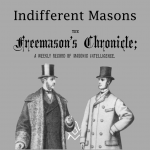 Nothing really changes, an article Indifferent Masons, From Le Monde Maçonnique 1874. Translation published in The Freemason's Chronicle 20th February, 1875 |
 In handling an intruder in the lodge, we endeavoured to show that a good Mason should be a gentleman, and a sincere man. The Freemason's Chronicle 20th February, 1875 |
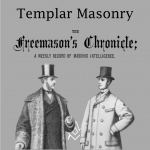 Templar Masonry - a historical aspect of the Religious and Military Order of the Temple published in The Freemason's Chronicle 13th February, 1875 |
 Secrecy perhaps the strongest objection urged by the enemies of the Masonic Order against its existence published in The Freemason's Chronicle 20th March 1875 |
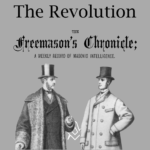 Freemasonry In The United States during And After The Revolution We take a look at Freemasonry in the United States during and after the Revolution first published in The Freemason's Chronicle - February 6, 1875 |
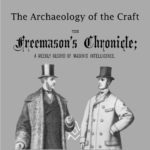 We take a look at the archaeological connection with the Craft, first published in The Freemason's Chronicle - January 30, 1875 |
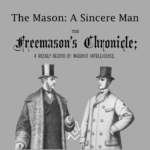 What it means to a Freemason to be a sincere man. Extract: first published in The Freemason's Chronicle - January 23, 1875 |
 What it means to a Freemason to be a citizen of the world ? First published in The Freemason's Chronicle - January 16, 1875 |
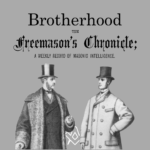 Brotherhood! In that one word what sympathetic associations arise. First published in The Freemason's Chronicle - January 9, 1875 |
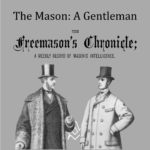 This opening article was written 145 years ago, yet it resonates with Freemasons today as it did then. First published in The Freemason's Chronicle, January 2, 1875, Issue 1 |
masonic knowledge
to be a better citizen of the world
share the square with two brothers

click image to open email app on mobile device








